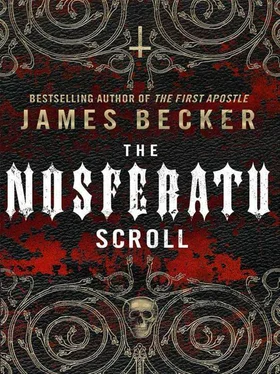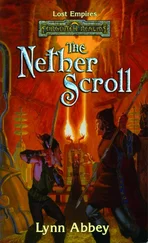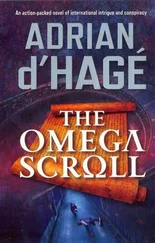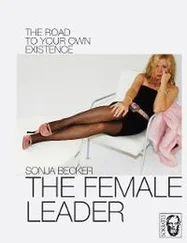James Becker - The Nosferatu Scroll
Здесь есть возможность читать онлайн «James Becker - The Nosferatu Scroll» весь текст электронной книги совершенно бесплатно (целиком полную версию без сокращений). В некоторых случаях можно слушать аудио, скачать через торрент в формате fb2 и присутствует краткое содержание. Жанр: Триллер, на английском языке. Описание произведения, (предисловие) а так же отзывы посетителей доступны на портале библиотеки ЛибКат.
- Название:The Nosferatu Scroll
- Автор:
- Жанр:
- Год:неизвестен
- ISBN:нет данных
- Рейтинг книги:4 / 5. Голосов: 1
-
Избранное:Добавить в избранное
- Отзывы:
-
Ваша оценка:
- 80
- 1
- 2
- 3
- 4
- 5
The Nosferatu Scroll: краткое содержание, описание и аннотация
Предлагаем к чтению аннотацию, описание, краткое содержание или предисловие (зависит от того, что написал сам автор книги «The Nosferatu Scroll»). Если вы не нашли необходимую информацию о книге — напишите в комментариях, мы постараемся отыскать её.
The Nosferatu Scroll — читать онлайн бесплатно полную книгу (весь текст) целиком
Ниже представлен текст книги, разбитый по страницам. Система сохранения места последней прочитанной страницы, позволяет с удобством читать онлайн бесплатно книгу «The Nosferatu Scroll», без необходимости каждый раз заново искать на чём Вы остановились. Поставьте закладку, и сможете в любой момент перейти на страницу, на которой закончили чтение.
Интервал:
Закладка:
With the body of Eleonora now safely consigned to the earth, Reznik had two more tasks to perform. The carriage was standing outside the church, the driver waiting for him. Reznik climbed up on to the vehicle and instructed the man to return to Krumlov Castle.
The gates were still wide open, but the courtyard was now virtually deserted. Only three men waited for Reznik’s return and the orders they expected him to issue. The priest stepped down from the carriage and walked across to them.
The men were all wearing tunics that identified them as servants of the Schwarzenberg dynasty, and two of them were armed with short swords, the scabbards buckled to their belts. It was these two men that Reznik approached first.
‘It’s time,’ he said. ‘Do it now. Kill them all, and dump the bodies in the forest.’
The men nodded, turned on their heels and vanished inside the building.
Reznik turned to the third man. ‘Show me the painting.’
The servant led Reznik into the castle and to a long gallery, at one end of which hung a life-size portrait of Eleonora. The priest stared at the princess’s pale face for a few moments, his lip curling in disgust.
‘Lift it down,’ he ordered.
Once the painting was leaning against the wall, Reznik took his folding knife and opened it. He drove the point of the blade through the canvas to the left of the princess’s head and hacked downwards in a vertical line. He repeated the operation on the right-hand side of the image as well, then sliced a horizontal line above the head to join the two cuts. He seized the flap of canvas that now fell forward, and started to cut along the last remaining side.
As his blade began cutting through the painted image of Eleonora’s neck, the mournful howl of an animal echoed through the vast old building.
The man beside Reznik glanced round in alarm, but the priest ignored the interruption. He completed the final cut through the canvas and stepped back, holding the painted image of the princess’s head in his left hand. He looked around and then stepped across to the nearest sconce in which a torch burned brightly. Taking it down, he held the flames to one corner of the square he’d removed from the painting. The canvas was heavy and the paint thick, and for a few seconds it merely smouldered. Then the fire took hold and it flared suddenly, the flames a kaleidoscopic mix of colours as the pigments in the paint were consumed by the heat. Reznik dropped the final corner of the canvas to the floor and watched as the last of the flames flickered and died.
‘Are there any other pictures showing that woman?’ he demanded. He couldn’t even bring himself to speak her name.
‘That was the last one. All the others have been destroyed.’
Reznik nodded in satisfaction. His work was done. The princess was buried in what amounted to an unmarked grave, and he had done his best to expunge all traces of her life, all reminders of her presence, from the castle.
Without a backwards glance, he walked out of the gallery and a few minutes later passed through the double gates that secured the courtyard of Krumlov Zamek. He knew he would never enter that cursed and wretched castle again.
He just hoped that he had done enough to stop the contagion before it took hold in the district.
But in that regard, Reznik was mistaken. Over the next few years he would officiate at nearly a dozen burials that would require him to use his peculiar and arcane knowledge, though none of these would involve another member of the aristocracy.
And on his own deathbed, nearly twenty years later, he would finally acknowledge the truth he had shied away from for all those years.
Because what happened in the months and years after the burial of Eleonora Amalia proved to him beyond doubt that she was not the source of the plague, as Reznik had always believed, but simply another victim.
1
Present day
‘This truly is a spectacular place,’ Chris Bronson said, looking back at the city of Venice.
It was the first day of November, and he and Angela were standing side by side in the stern of a crowded vaporetto that was ferrying them from the Fondamente Nuove stop on Venice itself across the lagoon to the Isola di San Michele — the island of St Michael — to take part in the celebrations known unofficially as the Festival of the Dead.
There was a stiff breeze blowing from the south-east, sufficiently strong to create dozens of white horses that surged all around the vessel, but the boat carved an arrow-straight wake through the choppy waters. The lights of the city were just starting to pierce the late-afternoon gloom, a gloom made more pronounced by the patches of mist that were forming over the water. Venice looked almost like a huge and improbable cruise ship, floating silently in the cool and shallow waters of the lagoon.
‘I thought you’d like it,’ Angela said, taking his arm to steady herself. ‘I wasn’t expecting this wind though. Is it the sirocco?’
Bronson shook his head. ‘No. It’s the wrong time of year. The sirocco only blows in the spring and summer.’
‘Well, I was hoping for a warm and balmy evening — a kind of last gasp of summer, if you like — but this feels more like the onset of winter.’
‘It is November, you know.’
Angela shivered slightly. She was wearing a pair of black trousers (she’d guessed that a skirt would be much less practical for climbing in and out of vaporettos during the evening), a white blouse and a kind of woollen tunic that Bronson had incautiously referred to as a cardigan, only to receive a loud sigh at his manifest lack of fashion sense. Over this, she was wearing a midnight-blue silk coat. Bronson liked it: it brought out the colour of her eyes. He could see now that it couldn’t be very warm.
Bronson had always regarded fashion as an easy way of separating large sums of money from gullible men — and even more gullible women — who were foolish enough to believe the rubbish spouted by the self-appointed fashion ‘experts’. He invariably dressed for comfort and practicality, selecting a shirt by opening a drawer and picking up the one that lay on top of the others. He chose trousers, socks and underwear using the same simple and, to him, foolproof system. His only concessions to fashion were that he normally wore dark colours, usually blues and blacks, and had never owned a pair of white socks. This evening, he had chosen a dark check shirt, slightly faded blue jeans, and a pair of black trainers. And his leather jacket was proof against even the strongest wind the Adriatic could produce.
Angela buttoned her coat, and snuggled closer to Bronson. ‘With your love of Italy, and all things Italian,’ she murmured, ‘I’m really surprised that you’ve never been to Venice before.’
‘I know,’ Bronson replied. ‘For some reason, I’ve spent my time on the west side of the country. So I know Rome, Florence, Pisa and Naples really well, but this is the first time I’ve ever visited the Adriatic coast. And it really is stunning.’
It had all been Angela’s idea. There had been an unexpected reduction in her workload at the British Museum, and for the first time since the start of her employment there she had found herself with almost nothing to do. She was a ceramics conservator, and spent most of her working day either trying to reassemble ancient pottery shards into something that resembled a recognizable vessel or writing reports and assessments for the benefit of other people who were trying to do pretty much the same thing.
And this lull in her workload had coincided neatly with the dates of Bronson’s final week’s leave for the year. Her ex-husband had planned to do little more than sit around at his home in Tunbridge Wells, watch a bit of television and, if he could summon the energy and enthusiasm, tackle a handful of DIY jobs that he knew needed doing. When Angela had suggested spending the week exploring Venice instead, Bronson had thought carefully about his choice for nearly a second and a half before agreeing to go with her. It was, he thought now as he put his arm round her, absolutely the right decision.
Читать дальшеИнтервал:
Закладка:
Похожие книги на «The Nosferatu Scroll»
Представляем Вашему вниманию похожие книги на «The Nosferatu Scroll» списком для выбора. Мы отобрали схожую по названию и смыслу литературу в надежде предоставить читателям больше вариантов отыскать новые, интересные, ещё непрочитанные произведения.
Обсуждение, отзывы о книге «The Nosferatu Scroll» и просто собственные мнения читателей. Оставьте ваши комментарии, напишите, что Вы думаете о произведении, его смысле или главных героях. Укажите что конкретно понравилось, а что нет, и почему Вы так считаете.












